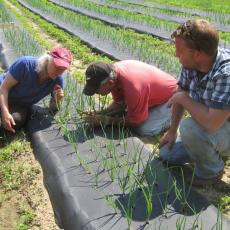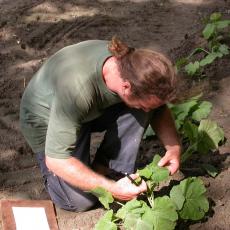In Our Spotlight
UMass Extension Vegetable Program
Climate change. The COVID-19 pandemic and its economic toll. Increasingly volatile weather trends. These are some of the significant challenges facing farmers today, and UMass Extension's Agriculture Program is here to help, whether it be through statewide education programs, visits to farms for technical assistance, applied research, or its periodic Vegetable Notes newsletter.
Genevieve Higgins, an educator in the Extension Agriculture Program’s Vegetable team, thinks about Extension’s extensive work with vegetable growers as a three-tier system: 1) deep engagement working with three to five “mentor farms” per year, 2) scouting for pests, and 3) answering questions through phone calls, emails, and text messages.
Three-Tier Farm Support System
Higgins explains that Extension’s Mentor Farms program involves an in-depth and long-term (up to three years) working relationship with three to five farms at any given time. Each Mentor Farm works closely with a designated Extension educator, who visits the farm every other week to scout for pests, make recommendations regarding management practices, do a field walk, and discuss anything else the farmers want to talk about.
The second tier is a broader network of farms on which the Vegetable team, which consists of four staff and a team of students, scouts the participating farms for pests. The scouting process involves the UMass team and farmers zig-zagging through the fields, and stopping at regular intervals to count the number of insects or diseases per plant, the goal of which is to obtain an unbiased sample of the whole field. The scouting process serves an important dual purpose: it extends Extension’s support to more farms, provides Extension with new information to report in its newsletter, and equips Extension faculty and staff with more knowledge to answer future questions from the farm community and the general public.
The final tier in Extension’s work with vegetable growers: responding to hundreds of phone calls, texts, and emails from farmers with questions. Extension is always available to answer pest identification questions, to learn about pests that farmers are finding, and to help with various other issues and questions. In 2021, the team answered 235 such questions from farmers across the state. The Extension Vegetable Program also sends out a Vegetable Notes newsletter to around 2,800 people across Massachusetts and New England. The newsletter, which is available for free to the public, reports on diseases, pests, and other research and information that growers might find useful. It is one of several newsletters for commercial growers from UMass Extension.
Cordelia’s Farm: A Collaboration in Action
Cordelia’s Farm, a family farm located in Berlin, Massachusetts, has benefitted from working with Extension in each tier of its support. Tim Wheeler, farm owner, explains that the ongoing relationship with the Extension team has been an important collaboration. “The fun part is that you’re working with a group of people that are inspired to take the challenge of learning at the same time you do.” The farm has always been interested in new opportunities to innovate, and UMass Extension has served as an important resource for new innovations at the farm since the 1980s. The farm’s early collaborations involved on-farm visits with Extension agents with expertise in vegetables, fruit, and food production.
Eventually, Cordelia’s Farm joined the Mentor Farm program. During the three-year engagement, the Extension team worked with the farm to address several projects, and focused on implementing high tunnel greenhouses and developing a system for cover cropping their fields. Higgins explains that cover crops help to slow erosion, improve soil health, enhance water availability, smother weeds, and control pests and diseases. “Work with cover crop… [has] had a big impact because that’s impacted every crop that we grow,” says Wheeler.
High tunnels, also known as hoop houses or high hoops, are greenhouse-like structures that are constructed in the field to extend the growing season, protect crops from weather, and keep pests away from crops. At the beginning of the three-year Mentor Farm engagement, Wheeler and the other family farmers at Cordelia’s recognized that their high tunnels weren’t being utilized as effectively as possible, so they identified high tunnels as a primary project. Working with former Extension educator Katie Campbell-Nelson, the farmers focused on growing tomatoes because their previous work with tomatoes in high tunnels had left them unsatisfied. Ultimately, with the help of the Extension team, Cordelia’s Farm made improvements in companion planting (i.e, planting different crops in proximity for the benefit of both plants), timing, and nutrient management in the high tunnels.
Developing a cover cropping system using hairy vetch – a type of cover crop that adds nitrogen to the soil – was a second important project at Cordelia’s in the 1990s. Ruth Hazzard, an Extension educator for vegetable growers at the time, helped to evaluate the impact of hairy vetch on nitrogen levels in corn. As a result of her findings, the farm was able to reduce the need for adding nitrogen to the soil, which provided cost savings. Cordelia’s continues to experiment with Extension on different cover crops; this year, for instance, farmers planted mustard on a piece of land where they would later plant strawberries. Later in the season, they will carry that information back to UMass so that other farmers can benefit from their innovations as well.
Cordelia’s Farm graduated from the Mentor Farms program after three years but its relationship with Extension continues in the form of scouting and occasional short visits. Last year, Jim Cronk, then a staff member with the Extension Fruit Program, worked with farmers on pest management for strawberries and cabbage, disease activity in the greenhouse, and a new foliar feed (a diluted fertilizer that is applied directly to the leaves of a plant). Cronk and farmers also looked at tissue culture results on blueberries from last year and decided on what needed to be sprayed to enhance their growth this year. “The ability to reduce the amount of pesticide and herbicide that we use results in some pretty significant time and dollars saved,” says Wheeler.
In addition to in-person visits, the farm also utilizes Extension’s digital opportunities for communication and collaboration. When a farmer catches wind of a problem in the field or in the greenhouse, they can easily snap a picture, send it along to somebody at Extension, and quickly receive advice. These questions typically involve disease identification or pest management problems.
The Extension Vegetable Notes newsletter is another tool helpful to Cordelia’s. Using information gathered from farms across Massachusetts and research from other states, UMass Extension is able to forecast the presence of disease as it migrates through the state, and report on it in the newsletter. Farms like Cordelia’s are then equipped with information to anticipate and prepare for the disease. “It’s always nice to be able to look at the newsletter and say, okay, that’s a problem over there and we can anticipate that given our past experience, we’ll have that same problem in another 10 days or so,” says Wheeler.
Throughout its 40-year history working with UMass Extension, Cordelia’s Farm has benefitted greatly from Extension’s services, whether it be the Mentor Farms program, scouting visits, or digital feedback. “The faces [of Extension professionals] change, but the opportunities to interact don’t. It’s just such a group of dedicated people,” says Wheeler. “This group of Extension agents that are there now have really made it easy for people from the whole spectrum of agriculture to feel comfortable about utilizing the services.”
Also of interest:
Deerfield, Massachusetts: Research Hub? Agricultural Research Flourishes at South Deerfield Farm


